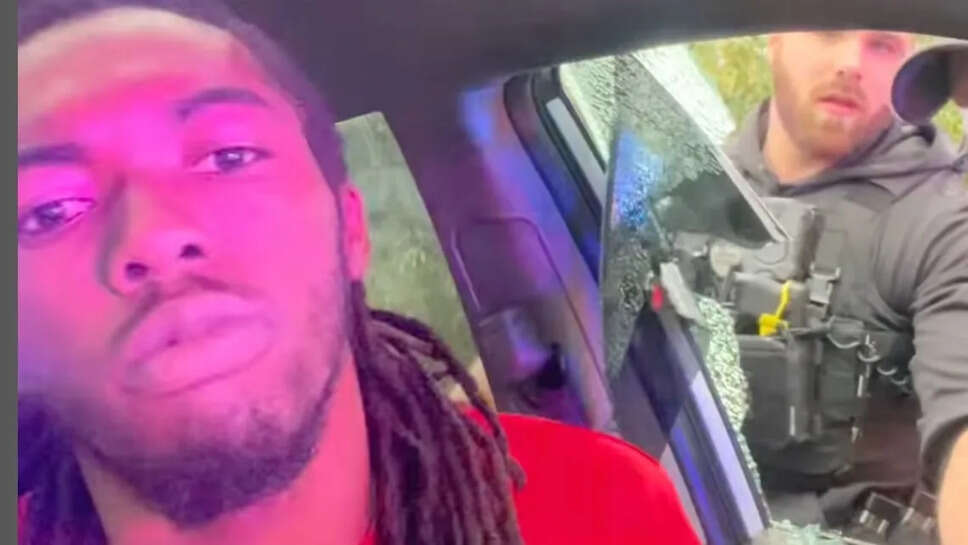Traffic stop turns violent as Florida cops forcibly remove Black driver

A seemingly routine traffic stop in Florida turned into a scene of chaos and violence as several police officers were recorded punching and forcibly dragging a Black man from his car. The incident has since sparked community outrage, with civil rights advocates and locals calling for accountability and a thorough investigation.
The Incident
It began like any other traffic stop—lights flashing, a car pulling over to the side of the road, and officers approaching the driver. The man behind the wheel appeared calm and cooperative at first glance. However, the situation escalated rapidly within minutes, leading to what many are calling a disturbing and unjustified display of police aggression.
Multiple officers surrounded the vehicle and were seen shouting instructions at the driver. Within moments, one of the officers opened the door, reached in, and began striking the man. Another joined in, pulling the driver by his arms as he screamed in protest and pain.
What followed was a shocking scene: punches, shouts, and then the driver being yanked from the car and pinned down on the pavement.
A Scene That Raises Questions
Bystanders who witnessed the incident were stunned. Several filmed the confrontation on their phones, their voices filled with disbelief and horror. One onlooker was heard saying, “He wasn’t resisting,” while another shouted, “You didn’t have to do all that!”
The footage, which quickly circulated online, has raised serious questions:
-
Why did the officers escalate the stop so quickly?
-
Was the level of force proportionate to the situation?
-
Could this have been de-escalated through better training or judgment?
-
Legal and Ethical Concerns
The use of force by police is always a complex issue, but this case taps into broader debates about racial profiling, systemic bias, and police brutality in the United States.
Legal experts are now weighing in, noting that unless the driver posed a clear and immediate threat to the officers, the level of violence used may be legally unjustifiable. Even if there was a failure to comply with commands, excessive physical aggression without imminent danger could violate constitutional protections.
Some lawyers familiar with police misconduct cases argue that even routine stops require officers to follow strict protocols and prioritize de-escalation, especially in communities with a history of strained police relations.
The Man at the Center
The man dragged from the car—described as a soft-spoken, hardworking individual by his family—has since been released from the hospital with injuries to his face, ribs, and back. Friends say he’s traumatized, not just by the pain but by the humiliation.
He reportedly told his family, “I didn’t even raise my voice. I didn’t fight. I just asked what I did wrong.” His words mirror the sentiments of countless Black men in America who live with the fear that any encounter with law enforcement could turn into a life-threatening event.
Community Outrage Builds
News of the incident has rocked the local community. Protesters gathered outside the city police department, holding signs reading “Justice for All” and “Stop Police Brutality.” The crowd, though peaceful, was loud and firm in its demand for accountability.
Many speakers at the demonstration emphasized that this wasn’t an isolated event. They shared stories of friends, brothers, and neighbors who had experienced harassment, aggression, or racial profiling by police.
“This happens too often to people who look like me,” one young protester said. “It’s not just about one man—it’s about a system that needs to change.”
Police Department Responds
The police department has acknowledged the incident and stated that an internal investigation is underway. The officers involved have been placed on temporary administrative leave pending the outcome.
A spokesperson said, “We take all allegations of misconduct seriously and will review the situation thoroughly.” However, no timeline has been given, and no charges have been filed—against either the officers or the driver.
This lack of immediate accountability has only fueled more frustration.
The Psychology of Power and Fear
Experts in law enforcement psychology often describe the dangers of adrenaline-driven decision-making. When officers are trained to see every encounter as potentially lethal, it can lead to quick escalations—even in situations where a calm approach might suffice.
On the other side, for Black Americans, encounters with police are often loaded with anxiety, fear, and the pressure to avoid any sudden movement or perceived “attitude,” lest they provoke a violent response.
This creates a toxic mix: one group walking on eggshells, the other ready to strike at the first sign of perceived danger.
The Cycle Continues
Sadly, incidents like this are not new. They are part of a pattern that stretches across states and years—a pattern of distrust, pain, and repeated calls for reform.
While each case adds to the growing pressure for change, progress remains slow. Police departments often resist outside scrutiny, union contracts protect officers from swift discipline, and political leaders issue statements without taking legislative action.
What Comes Next?
For now, the victim and his family are recovering—not just from physical wounds, but from the emotional damage that comes with public dehumanization. Legal action may follow, and civil rights groups have already expressed interest in supporting his case.
But what the community truly seeks is not just justice for one man, but a commitment to lasting reform—training, oversight, accountability, and a change in culture that prioritizes humanity over force.
Until then, the echoes of yet another traffic stop turned violent will linger as a painful reminder of the work still left to do.
.jpg)